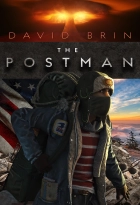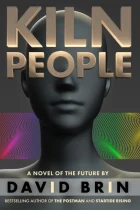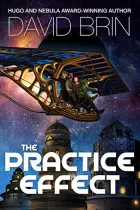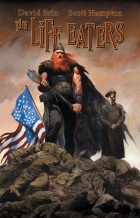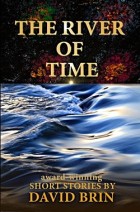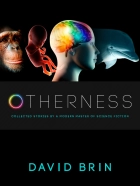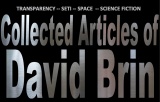 Many folks have created tallies of favorite Science Fiction novels. I’ve already weighed in with my Top SF for Young Adults and my Top Ten list. See also these essays: A Comparison of Science Fiction vs. Fantasy and How to Define Science Fiction.
Many folks have created tallies of favorite Science Fiction novels. I’ve already weighed in with my Top SF for Young Adults and my Top Ten list. See also these essays: A Comparison of Science Fiction vs. Fantasy and How to Define Science Fiction.
But now let’s try something much more ambitious — a bigger, broader reading compilation. This is still just a sampler – for something comprehensive, see the Science Fiction Encyclopedia or the user-friendly Worlds Without End. But any person who has read all the books and stories and authors noted here (and I admit they are heavy on “classics”) can come away with bragging rights to say: “I know something about science fiction.”
For this list I divide the novels authors and stories in my own quirky manner , according to categories…
* DIRE WARNINGS AND SELF PREVENTING PROPHECIES:
 These novels and shorter works have drawn millions to ponder many different kinds of danger that may lurk down the road ahead. Among our possible tomorrows, so many might be dreadful-but-avoidable – from tyranny to ecological deterioration to some tragic failure of citizenship. A few of these books even attained the most powerful status any work of fiction can achieve … changing the future, by alerting millions, who then girded themselves, discussing the problem with neighbors, becoming active, vowing to help ensure the bad thing never happens.
These novels and shorter works have drawn millions to ponder many different kinds of danger that may lurk down the road ahead. Among our possible tomorrows, so many might be dreadful-but-avoidable – from tyranny to ecological deterioration to some tragic failure of citizenship. A few of these books even attained the most powerful status any work of fiction can achieve … changing the future, by alerting millions, who then girded themselves, discussing the problem with neighbors, becoming active, vowing to help ensure the bad thing never happens.
The following examples of self-preventing prophecy stand out. All of them help us focus on something that we may desperately miss, if it were ever gone
Nineteen Eighty-Four, by George Orwell.
 The Sheep Look Up, by John Brunner
The Sheep Look Up, by John Brunner
A Canticle for Leibowitz, by Walter M. Miller, Jr.
Make Room! Make Room! by Harry Harrison (basis for the film Soylent Green)
Brave New World, by Aldous Huxley
“Harrison Bergeron” by Kurt Vonnegut Jr.
On The Beach, by Nevil Shute
We, by Yevgeny Zamyatin
The Cool War, by Frederik Pohl
The Disappearance, by Philip Wylie
Flood, by Stephen Baxter
The Windup Girl, by Paolo Bacigalupi
The Unincorporated Man, by Dani Kollin & Eytan Kollin
… plus almost anything by Alice Sheldon (James Tiptree Jr.), or Nancy Kress or Octavia Butler… I leave it to others to decide whether my own apocalyptic warning novel, The Postman. belongs on this list.
* HARBINGERS OF HOPE:
These tales offer something almost as important as warnings… a tantalyzing glimpse at (guardedly and tentatively) better tomorrows. It’s actually much harder to do than issuing dire warnings! (That may be why there’s so little optimism in print. Most authors and directors are simply too lazy.)
 Stand on Zanzibar, by John Brunner
Stand on Zanzibar, by John Brunner
Beyond This Horizon, by Robert A. Heinlein*
Rainbow’s End, by Vernor Vinge
Consider Phlebas, by Iain Banks (and his Culture Series)
Island, by Aldous Huxley
Pacific Edge, by Kim Stanley Robinson
… plus the entire sub-genre known as Star Trek, among the few places where you come away feeling envious of our grandkids – the way things ought to be….
* HUH! I NEVER REALIZED!
 Some tales simply rock readers back with wondrous stories that also broaden their perspective… from strange cultures to alternate social systems to unusual ways of thinking.
Some tales simply rock readers back with wondrous stories that also broaden their perspective… from strange cultures to alternate social systems to unusual ways of thinking.
Lord of Light, by Roger Zelazny
Dune, by Frank Herbert
The Dispossessed, by Ursula K. LeGuin
Courtship Rite, by Donald Kingsbury
The Years of Rice and Salt, by Kim Stanley Robinson
A Deepness in the Sky, by Vernor Vinge
Snow Crash, by Neal Stephenson
…plus the “Nine Worlds” series of John Varley and the brain-twistings of Samuel Delaney…
* THE HARD STUFF:
Take me someplace new. Boggle me with possibilities grounded in this strange-real universe of science! Almost anything by these authors will give you tons of the real meat of SF.
 Timescape, by Gregory Benford
Timescape, by Gregory Benford
Eon, by Greg Bear
The Foundation Trilogy, by Isaac Asimov
FlashForward, by Robert Sawyer
Tau Zero, by Poul Anderson
Ringworld, by Larry Niven
Diaspora or Quarantine, by Greg Egan
To Crush the Moon, by Wil McCarthy
Vast, by Linda Nagata
Anti-Ice, by Stephen Baxter
The Web Between the Worlds by Charles Sheffield
Spin, by Robert Charles Wilson
… plus many works by Joe Haldeman, John Varley, Elizabeth Bear, Charles Gannon, Jack McDevitt….
* FANTASY – WITH BRAINS:
Just because there’s magic and wizards and kings and such… doesn’t mean it has to be lobotomizing. There really are exceptions!
 The Drawing of the Dark, by Tim Powers
The Drawing of the Dark, by Tim Powers
The Lord of the Rings, by JRR Tolkien (yes, there are Elfs. But JRRT was exceptionally smart and honest about the attractions and drawbacks of nostalgia)
Harry Potter and the Methods of Rationality, by Eliezer Yudkowsky (only available for free, online)
Neverwhere, by Neil Gaiman
The City and The City, by China Mieville
Boneshaker, by Cherie Priest
… plus glowing works by John Crowley and “urban” fantasies by Emma Bull, Nalo Hopkinson, Geoff Ryman…
.
 *GEDANKENEXPERIMENTS:
*GEDANKENEXPERIMENTS:
Or… what if things were different?
The Stars My Destination, by Alfred Bester
Dying Inside, by Robert Silverberg
Childhood’s End, by Arthur C. Clarke
Brain Wave, by Poul Anderson
The Yiddish Policeman’s Union, by Michael Chabon
BlindSight, by Peter Watts
*RIP-SNORTING GOOD STORYTELLING:

Explains itself. Just go along for the ride.
The Forever War, by Joe Haldeman
Gateway, by Frederick Pohl
The Mote in God’s Eye, by Larry Niven and Jerry Pournelle
Old Man’s War, by John Scalzi
The Great Time Machine Hoax or Earthblood, by Keith Laumer
The Princess Bride, by William Goldman
… plus anything at all by Poul Anderson. I mean it.
*ALTERNATIVE HISTORY/PARALLEL WORLDS:

Extra points if it seems plausible that this might-have-been really might have been. And even more points if the reader goes, “That world seems likelier than this one I’m living in!”
The Man in the High Castle, by Philip K. Dick
1632, by Eric Flint
Cryptonomicon, by Neal Stephenson
The Great War (series) by Harry Turtledove
Bring the Jubilee, Ward W. Moore
Lest Darkness Fall, by L. Sprague deCamp
 *TIME TRAVEL:
*TIME TRAVEL:
Here the biggest test is whether you can offer a new or surprising logical twist. Bring on them paradoxes!
The Man Who Folded Himself, by David Gerrold
Up the Line, by Robert Silverberg
Run, Come See Jerusalem, by Richard Meredith
The Big Time, by Fritz Leiber
“All You Zombies” and “By His Bootstraps” by Robert A. Heinlein
Doomsday Book, by Connie Willis
The Technicolor Time Machine, by Harry Harrison
* HUMOR:
The hardest thing of all to do well. Someday I might dare to try this most-difficult type!
 The Ultimate Hitchhiker’s Guide to the Galaxy, Douglas Adams
The Ultimate Hitchhiker’s Guide to the Galaxy, Douglas Adams
Bored of the Rings, A Parody of J.R.R. Tolkien’s Lord of the Rings, by the Harvard Lampoon
Hoka! Hoka! Hoka! by Poul Anderson and Gordon Dickson
The Colour of Magic, by Terry Pratchett
“Blued Moon” in Fire Watch, by Connie Willis
… plus snorkers by Esther Freisner and punny-business by Spider Robinson and groaners by Mike Resnick.
.
* SHEER BEAUTY:
Forget science, logic and other superficialities. Just love it. The words… the words…
 The Martian Chronicles, by Ray Bradbury
The Martian Chronicles, by Ray Bradbury
Gravity’s Rainbow, by Thomas Pynchon
Riddley Walker, by Russel Hoban
Hyperion, by Dan Simmons
The Book of the New Sun, by Gene Wolf
The Rediscovery of Men, by Cordwainer Smith
More than Human, by Theodore Sturgeon
“‘Repent Harlequin!’ Said the Ticktockman” by Harlan Ellison
…plus anything by Robert Sheckley (one of my all time favorite authors).
.
* QUIRKY CLASSICS:
Going farther back … hey it’s a kind of time travel!
 The Time Machine, by H.G. Wells
The Time Machine, by H.G. Wells
20,000 Leagues Under the Sea, by Jules Verne
Last and First Men, by Olaf Stapledon
Herland, by Charlotte Perkins Gilman
After Many a Summer Dies the Swan, by Aldous Huxley
The World, The Flesh, and the Devil by JD Bernal
When Worlds Collide, by Balmer & Wylie
Plus an influential international item, Journey to the West by Wu Cheng’en
…plus… well… you aren’t truly steeped in the genre till you’ve wallowed in Doc Smith and Edgar Rice Burroughs.. and Conan!
* PREDICTIVE SUCCESS!
 We SF authors often disclaim any intent to foretell the future. We explore it, test possibilities, perform gedankenexperiments, even warn or entice. But predict? Well, at times we do try… and even keep score! My fans maintain a wiki tracking hits and misses from my most predictive near-term book to date – Earth. Here are some looks-ahead that have been impressively on-target.
We SF authors often disclaim any intent to foretell the future. We explore it, test possibilities, perform gedankenexperiments, even warn or entice. But predict? Well, at times we do try… and even keep score! My fans maintain a wiki tracking hits and misses from my most predictive near-term book to date – Earth. Here are some looks-ahead that have been impressively on-target.
Shockwave Rider, by John Brunner
Beyond This Horizon, by Robert A. Heinlein*
“The Brick Moon” by E. E. Hale (1865)
Neuromancer, by William Gibson
Age of the Pussyfoot, by Frederick Pohl
…plus at least half of the tales ever written by Jules Verne!
 * BEST FOR YOUNG ADULTS AND KIDS:
* BEST FOR YOUNG ADULTS AND KIDS:
Or for those young at heart. (See my separate list of Young Adult Recommendations.)
Rite of Passage, by Alexei Panshin
Little Fuzzy, by H. Beam Piper
The Door into Summer, by Robert A. Heinlein
The High Crusade, by Poul Anderson
A Spell for Chameleon, by Piers Anthony
Orbital Resonance, by John Barnes
The Chanur Saga, by C.J. Cherryh
 The Ship Who Sang, by Anne McCaffrey
The Ship Who Sang, by Anne McCaffrey
The Disappearance, by Philip Wylie
Pilgrimage, by Zenna Henderson
Emergence, by David Palmer
Little Brother, by Cory Doctorow
Leviathan, by Scott Westerfield
… plus anything by Andre Norton, H. Beam Piper… and check out my Out of Time series!
* OTHER WORTHY AUTHORS: Try some on!
 Charles Stross, Kay Kenyon, Syne Mitchell. Paul McAuley, Howard Hendrix, Charles Gannon,… but also explore on your own!
Charles Stross, Kay Kenyon, Syne Mitchell. Paul McAuley, Howard Hendrix, Charles Gannon,… but also explore on your own!
*AND SF ISN’T JUST ANGLO-AMERICAN
International contributions to this genre are undeniable. Indeed, it would be churlishly socio-centric to ignore great titles like Roadside Picnic (Arkady and Boris Strugatsky), The Cyberiad (Stanislaw Lem), We (Evgeni Zamyatin: mentioned in dark prophecies, above), The Paper Spaceship (Tetsu Yano) and Japan Sinks (by my Worldcon co-GoH Sakyo Komatsu). In fact, this is a whole ‘nother category deserving a whole ‘nother list! And your suggestions are welcome.
.
Okay… that will have to do. Eccentric and opinionated and far from comprehensive, this is hardly more than a sampling and a biased one too. Yes, there are a fair number of older classics, but also a sampling of marvelous works by new, upcoming authors.
(Note: surely there will be many suggested titles pushed in followup discussion!)
Still, I am confident that if you went thoroughly through this list – noting those you loved or respected and a few works you hate! – then you’d at least have made a good start getting a taste of the boldness, the excitement, the intellectual verve and challenging ideas to be found in this, the most unabashed and courageous of all literary forms.
* Regarding Heinlein’s Beyond This Horizon, it is in the thoughtful second half of the book that you get amazingly insightful ruminations about what a smarter human civilization might be like. This requires wading through a much more pedestrian and even silly “action” half. But it’s worth the effort.
See more Speculations on Science Fiction
David Brin
http://www.davidbrin.com
Twitter Facebook






























 Timescape
Timescape












